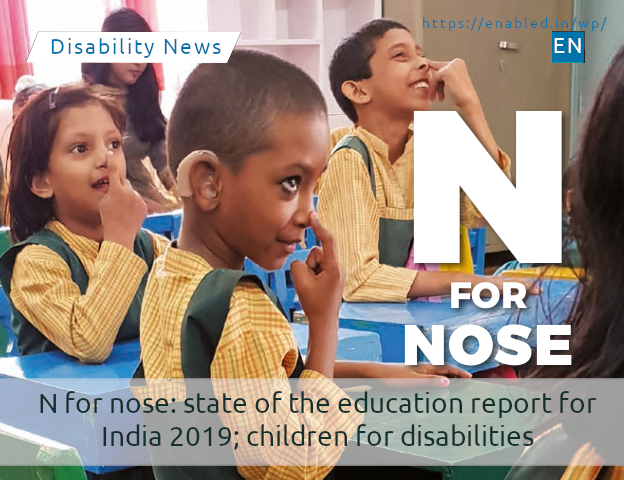Title: N for nose: state of the education report for India 2019; children for disabilities
Corporate author: UNESCO Office New Delhi [171]
ISBN: 978-81-89218-67-6
Collation: 152 pages : illustrations
Language: English
Year of publication: 2019
Type of document: book
Authors and Editorial Board members
- Mythili Ramchand,
- Bhagyalaxmi Velugu,
- Archana Mehendale, TATA Institute of Social Sciences
- Dr Venkata Subba Rao Ilapavuluri, Secretary to the Vice President of India;
- Dr Sara Varughese, Country Director & Managing Trustee, CBM Foundation
- Dr Anantha Duraiappah, Director, UNESCO MGIEP;
- Rajive Raturi, Law and Policy Division, NCPEDP
- Arman Ali, Executive Director, National Centre for Promotion of Employment for Disabled People (NCPEDP);
- Professor Anita Julka, Former Head, Department of Education of Groups with Special Needs, NCERT;
- Eric Falt, Director and UNESCO Representative, New Delhi
Table of contents
- Executive summary
- Chapter 1- About the report (Context; Scope; Methodology; Structure)
- Chapter 2 – Introduction (Overview of international commitments;
- Overview of national legal frameworks and policies)
- Chapter 3 – Vision to promote right to inclusive education (Understanding disability and education; Approaches to educating children with disabilities)
- Chapter 4 – Schemes and programmes: coherence and synergies
- Chapter 5 – Situational analysis of education for children with disabilities
- Chapter 6 – Barriers to inclusive education for children with disabilities (Attitudinal barriers; Accessibility; Curricula, pedagogy and teaching materials; Assessment; Medical diagnosis of disability )
- Chapter 7 – Systemic issues in implementing inclusive education (Early childhood interventions; Implementation of the RTE Act 2009 and Rpwd Act 2016; Human resources: provisions, practices and problems Data systems for effective inclusion of children with disabilities Governance and finance )
- Chapter 8 – Recommendations
Recommendation
- Recommendation 1 – Amend the RTE Act to better align with the RPWD Act by including specific concerns of education of children with disabilities.
- Recommendation 2 – Establish a coordinating mechanism under MHRD for effective convergence of all education programmes of children with disabilities.
- Recommendation 3 – Ensure specific and adequate financial allocation in education budgets to meet the learning needs of children with disabilities.
- Recommendation 4 – Strengthen data systems to make them robust, reliable and useful for planning, implementation and monitoring.
- Recommendation 5 – Enrich school ecosystems and involve all stakeholders in support of children with disabilities.
- Recommendation 6 – Massively expand the use of information technology for the education of children with disabilities.
- Recommendation 7 – Give a chance to every child and leave no child with disability behind.
- Recommendation 8 – Transform teaching practices to aid the inclusion of diverse learners.
- Recommendation 9 – Overcome stereotypes and build positive dispositions towards children with disabilities, both in the classroom and beyond.
- Recommendation 10 – Foster effective partnerships involving government, civil society, the private sector and local communities for the benefit of children with disabilities.
